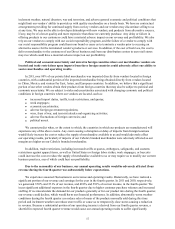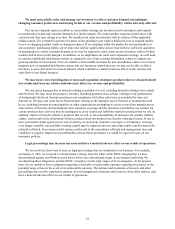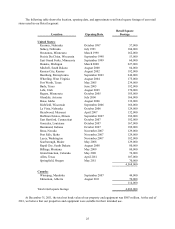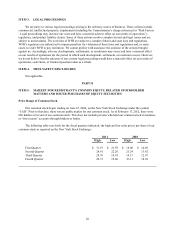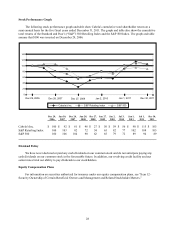Cabela's 2011 Annual Report Download - page 33
Download and view the complete annual report
Please find page 33 of the 2011 Cabela's annual report below. You can navigate through the pages in the report by either clicking on the pages listed below, or by using the keyword search tool below to find specific information within the annual report.23
As directed by the Reform Act, the United States Government Accountability Office released a report on
January 20, 2012, that examines the potential implications of eliminating certain exceptions under the BHCA,
including the exception for credit card banks. It is unclear whether this report will lead to any additional legislative
or regulatory action. If the credit card bank exception were eliminated or modified, we may be required to divest
our ownership of WFB unless we were willing and able to become a bank holding company under the BHCA. Any
such forced divestiture would materially adversely affect our business and results of operations.
The Reform Act will also affect a number of significant changes relating to asset-backed securities, including
additional oversight and regulation of credit rating agencies and additional reporting and disclosure requirements.
In addition, the Reform Act will prohibit issuers and payment card networks from placing restrictions on vendors
relating to credit card transactions, which could affect consumer behavior and the use of credit cards as a form
of payment.
The Reform Act will also likely result in increased scrutiny and oversight of consumer financial services and
products, including credit cards, primarily through the establishment of the Bureau within the Federal Reserve.
The Bureau will have broad rulemaking and enforcement authority over providers of credit, savings, and payment
services and products. The Bureau will have rulemaking and interpretive authority under existing and future
consumer financial services laws and supervisory, examination, and enforcement authority over institutions subject
to its jurisdiction. State officials are authorized to enforce consumer protection rules issued by the Bureau.
Many provisions of the Reform Act require the adoption of rules to implement. In addition, the Reform
Act mandates multiple studies, which could result in additional legislative or regulatory action. The effect of the
Reform Act and its implementing regulations on WFB’s business and operations could be significant. In addition,
we may be required to invest significant management time and resources to address the various provisions of the
Reform Act and the numerous regulations that are required to be issued under it. The Reform Act, any related
legislation, and any implementing regulations could have a material adverse effect on our business, results of
operations, and financial condition.
Changes in interest rates could have a negative impact on our earnings.
In connection with our Financial Services business, we borrow money from institutions and accept funds
by issuing brokered and non-brokered certificates of deposit and secured borrowings, which we then lend to
cardholders. We earn interest on the cardholders’ account balances, and pay interest on the certificates of deposit
and borrowings we use to fund those loans. Changes in these two interest rates affect the value of the assets and
liabilities of our Financial Services business. If the rate of interest we pay on borrowings increases more (or more
rapidly) than the rate of interest we earn on loans, our net interest income, and therefore our earnings, could fall.
Our earnings could also be materially adversely affected if the rates on our credit card account balances fall more
quickly than those on our borrowings. In addition, at December 31, 2011, approximately 34% of our cardholders did
not maintain balances on their credit card accounts. We do not earn any interest from these accounts but do earn
other fees from these accounts such as Visa interchange fees. In the event interest rates rise, the spread between the
interest rate we pay on our borrowings and the fees we earn from these accounts may change and our profitability
may be materially adversely affected.
Credit card industry litigation and regulation could adversely impact the amount of revenue our
Financial Services business generates from interchange fees.
Our Financial Services business faces possible risk from the outcomes of certain credit card industry
litigation and potential regulation of interchange fees. For example, a number of entities, each purporting to
represent a class of retail merchants, have sued Visa and several member banks, and other credit card associations,
alleging, among other things, that Visa and its member banks have violated United States antitrust laws by
conspiring to fix the level of interchange fees. To date, we have not been named as a defendant in any credit card
industry lawsuits. Moreover, the amount of interchange fees that are charged to merchants could be capped or
limited by credit card industry regulation. If the interchange fees that are charged to merchants are reduced as a
result of the interchange lawsuits or regulation, the financial condition and results of operations of our Financial
Services business may be negatively impacted.






